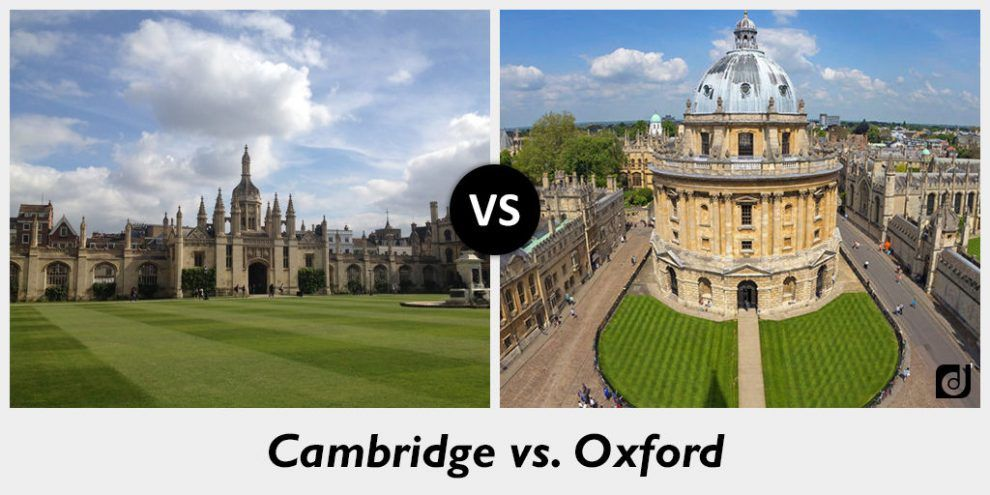
12 Jun
2022
Oxford or Cambridge?
<p>It’s a tough choice. But we’re here to help you out. There are many factors to consider, including the nature of the course offered, the ability to attend an interview in your home country as well as the likelihood of being admitted to your desired course.</p><p> </p><p><strong>Courses offered</strong></p><p>One major criterion is whether the university offers a course which you’re interested in. You should bear in mind that the courses offered at Oxford and Cambridge may be different. You won’t always find the same course being offered at both universities. In relation to that, two main observations can be made:</p><p>1) The courses at Oxford often involve joint degrees. For example, prominent joint degrees at Oxford include:</p><p>PPE (Politics, Philosophy and Economics)</p><p>E&M (Economics & Management)</p><p>Mathematics & (Computer Sciences or Philosophy, Statistics)</p><p>History & (Economics, English, Modern Languages, Politics)</p><p>On the other hand, Cambridge tends to offer single degrees. That is not necessarily a disadvantage. If you look closely at the course contents, you’ll find that the Cambridge courses can provide exposure to a broad spectrum of different but related disciplines. For instance:</p><p>Natural Sciences - this course allows you to select topics from different fields or specialise in one particular area in the later part of your degree</p><p>Mathematics - students taking this course will be allowed to take Physics related modules from the second year onwards</p><p>Computer Sciences - students are allowed to take Mathematics related modules</p><p>2) There are a few courses which are offered at one university but not the other. Examples of courses offered solely at Cambridge include Architecture and Land Economy.</p><p> </p><p><strong>Overseas Interviews for International Applicants</strong></p><p>Interviews are an integral part of the Oxbridge admissions process. Local and EU students will be required to appear in person for an interview. For international students who are unable to travel all the way to the UK, there are other options.</p><p>For example, Cambridge has an interview team which visits certain countries (Shanghai, Hong Kong, Malaysia, Singapore, Canada and India) in October. So you have the option of having your interview in one of these countries.</p><p>Applicants from South Korea can choose to either be interviewed in Cambridge or Singapore. Please bear in mind that the interview arrangement varies across subjects as well, so for more information about alternative interview arrangements, do read the Degree Specifics section.</p><p> </p><p><strong>Chances of Being Shortlisted for Interview</strong></p><p>Generally speaking, Cambridge tends to invite a higher proportion of its applicants to its interviews. Therefore, students who are relatively more eloquent can consider applying to Cambridge, where your oral communication skills can help you stand out during the interview. </p><p> </p><p><strong>Grades Required When Making an Application</strong></p><p>Cambridge puts more emphasis on academic test grades and will request that you include the specific % score (applicable for A-Levels only) on their COPA/SAQ forms. Therefore, the higher the UMS, the better. This is not required for Oxford applications.</p><p> </p><p><strong>Conditional Offer Requirements</strong></p><p>After a successful interview, the colleges will most likely make you a conditional offer with certain grade requirements. Cambridge tends to request higher grades than Oxford</p><figure class="table"><table><tbody><tr><td> </td><td>A-Level</td><td>IB</td></tr><tr><td>Cambridge</td><td>A*A*A</td><td>40-42</td></tr><tr><td>Oxford</td><td>A*AA</td><td>38-40</td></tr></tbody></table></figure><p>*Average conditional offer grades/ the actual may differ depending on the specific course</p><p>What happens if you don’t meet them? Sometimes the university will still admit you to the course, but it depends. For IB students, achieving a score of 42 is a common requirement. This can be very challenging. It has been observed that the number of applicants who failed to meet the IB score but still got admitted to their course tends to be higher for Oxford. In this regard, it seems that Cambridge imposes stricter conditional offer requirements.</p>